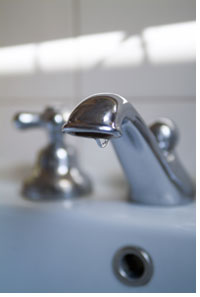Controlling Indoor Moisture
By Jill Moore
Photo: © Angelo Gilardelli/ Dreamstime
 Have you ever stepped into a home and immediately noticed an unpleasant musty odor? In addition to unpleasant odors, excess moisture in the home can cause other issues including hazardous mold, medical problems, and costly damage. It's important to take the necessary steps to control excess moisture and repair problems immediately. Have you ever stepped into a home and immediately noticed an unpleasant musty odor? In addition to unpleasant odors, excess moisture in the home can cause other issues including hazardous mold, medical problems, and costly damage. It's important to take the necessary steps to control excess moisture and repair problems immediately.
Repair Leaky Pipes - Check household pipes for leaks by wiping them with a clean dry cloth to remove excess moisture, and look for puddles and exceptionally damp spots in specific areas. If a small leak is discovered, you might be able to stop it with pipe sealing products, but if the leak is more serious, hire a licensed plumber as soon as possible to complete the repair.
Wrap Sweating Pipes - If household pipes seem to be the source of the moisture, they might simply be sweating. After ruling out the possibility of a leak, invest in pipe insulation. Pipe wrap is made of a durable foam material, it's very easy to install, and it's an inexpensive way to correct a very common problem.
Properly Ventilate the Dryer - Clothes dryers must be properly ventilated to the outdoors unless they're attached to a special attachment that allows for indoor ventilation.
|
A dryer with a missing or damaged tube can quickly cause serious moisture problems in a home. Inspect the connection that vents your dryer to the outdoors to be sure it's properly attached and undamaged.
Repair Foundation Cracks - It's not unusual for cracks to appear in concrete foundations after a house begins to settle. Rainwater sometimes finds its way into a home through these cracks, but if they're small, they really aren't difficult to repair. Invest in a ready-mixed container of concrete crack filler, and follow product label instructions for best results. If the crack is too large or the repair doesn't hold, don't wait until incoming moisture causes serious problems. Call a professional for advice and immediate assistance.
Eaves Troughs - Eaves troughs collect rainwater and moisture from the roof, and downspouts direct it away from the foundation. Make sure your eaves troughs aren't leaking or full of debris, and seal them with outdoor caulking if necessary. Also, if your downspouts aren't directing the water far enough away from your home, consider investing in longer attachments. Water that runs down the sides of the foundation can cause serious damage, especially if cracks occur and water runs into the home.
Invest in a Dehumidifier - After finding and correcting the source of a moisture problem in the home, consider investing in a top-quality dehumidifier. A quality dehumidifier will effectively pull excess moisture out of the air, which will in turn help control musty odors. |
 Have you ever stepped into a home and immediately noticed an unpleasant musty odor? In addition to unpleasant odors, excess moisture in the home can cause other issues including hazardous mold, medical problems, and costly damage. It's important to take the necessary steps to control excess moisture and repair problems immediately.
Have you ever stepped into a home and immediately noticed an unpleasant musty odor? In addition to unpleasant odors, excess moisture in the home can cause other issues including hazardous mold, medical problems, and costly damage. It's important to take the necessary steps to control excess moisture and repair problems immediately.